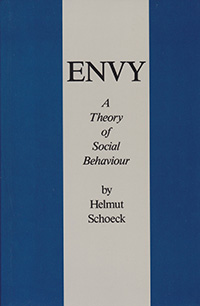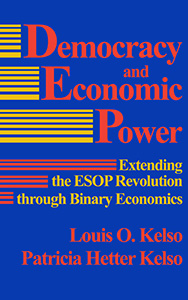 by Helmut Schoeck, translated from the German by Michael Glermy and Betty Ross, Harcourt, Brace & World, Inc., New York, 1969. Republished (1987) and currently available from Liberty Fund, Inc., 8335 Allison Pointe Trail #300, Indianapolis, IN 46250-1684.
by Helmut Schoeck, translated from the German by Michael Glermy and Betty Ross, Harcourt, Brace & World, Inc., New York, 1969. Republished (1987) and currently available from Liberty Fund, Inc., 8335 Allison Pointe Trail #300, Indianapolis, IN 46250-1684.
Reviewed by Louis O. Kelso and Patricia Hetter
This is a life source book for those who believe with Socrates that the gateway to wisdom is self-knowledge. The beam Professor Schoeck shines into the depths of the human psyche is as pitiless and intense as an arc light; as sharp and penetrating as a laser. The fact that our century has repressed the entire concept of envy as rigorously as the Victorians repressed sex makes the reading compulsively fascinating. Schoeck has broken through a powerful taboo that has kept us from knowing ourselves and others.
Envy is Public, Not Only Private
Envy to Schoeck is much more than a universal though culpable private emotion. It is the social impulse itself. Man’s capacity for envy — and his fear of being envied — are the web of tension which holds members of society in equilibrium vis-a-vis each other. The individual is able to negotiate the perilous middle ground because his social instinct functions like an envystat, constantly envying, and measuring and regulating the aggressive energy that envy of him is provoking in others. The envied responds with instant fear and guilt; automatically he adjusts his behavior to placate the envier. The victorious athlete’s “Just luck, I guess;” the Japanese miserable-me, exalted-you ritual, even the Christian virtue of humility — all are examples of envy avoidance. Envy’s function is to regulate relations between individuals, making association and cooperation possible, if controlled; impossible, if not. Schoeck also suggests that envy is the source of those free-floating, pervasive but objectively groundless feelings of guilt which are the psychic burden of humanity — the existential guilt which the scapegoat, religion, and psychotherapy have been invented to siphon off.
The Politics of Envy
Had Schoeck confined his analysis to psychology and literature, doubtless his book would not have been greeted with chill in the United States, a country which Schoeck knows embarrassingly well and to which he addresses some of his most caustic points. But Schoeck has had the audacity to explore the role of envy in politics; this puts him squarely in the middle of the ideological war. “Few discoveries are more irritating than those which expose the pedigree of ideas,” said Lord Acton.
The truth that envy is at the root of his egalitarian passion is irritating indeed to the Socialist’s ear. Schoeck has even more disagreeable news for the liberal. With the totality characteristic of Germanic scholarship, he documents the charge that over the past 150 years, western industrial society has institutionalized envy, and made the pathologically envious man the arbiter of “social justice.” Useful as envy may be for enforcing social control and cohesion, a little envy — like a little electricity — goes a long way. Envy is destructive; all viable cultures have condemned the envious man as a danger to the community and to himself. Allowing envy to serve as society’s conscience is like making the devil chief justice. An envious society can never be creative or joyful, for envy — not hate — is the opposite of love. Schoeck exposes the moral ugliness of trying to achieve economic justice through tyrannical and envy-inspired redistribution of wealth. Evil means subvert the most noble goals, as we all should have learned by now.
Envy and Economics
Unhappily, no industrial economy, under existing economic concepts, can dispense with the necessity for redistribution. Economists and politicians know of no other way to get purchasing power into the hands of those made economically unproductive by technological advance. Envy has been institutionalized because a defect in the invisible structure (the legal structure) of the market economy requires it — a defect traditional economics does not understand or know how to correct. The result of the defect is perennial under-consumption and periodic economic collapse, which only progressively more frantic redistribution can (temporarily) avert. Envy facilitates the redistribution which everyone — recipients not least — find so unpalatable in practice. Thus a shadowy psychological propensity — envy — reinforces almost accidentally the practical necessity that in a market economy purchasing power must be matched with unsatisfied needs and wants on the part of consumers.
Toward a Non-Envying Society
The alternative — and Schoeck makes a most powerful indirect case for it — is to systematically restore the diminishing economic productiveness of the many by enabling them to acquire, by legitimate means, private ownership of the productive capital which is replacing or diminishing the value of their labor power in industrial production. Elsewhere we have suggested how this objective might be accomplished in the process of financing economic growth. An independent, productive, generally affluent people can afford to control the less wholesome aspects of human nature. Poverty and lack of economic opportunity in a society make the political exploitation of envy inevitable and irresistable.

